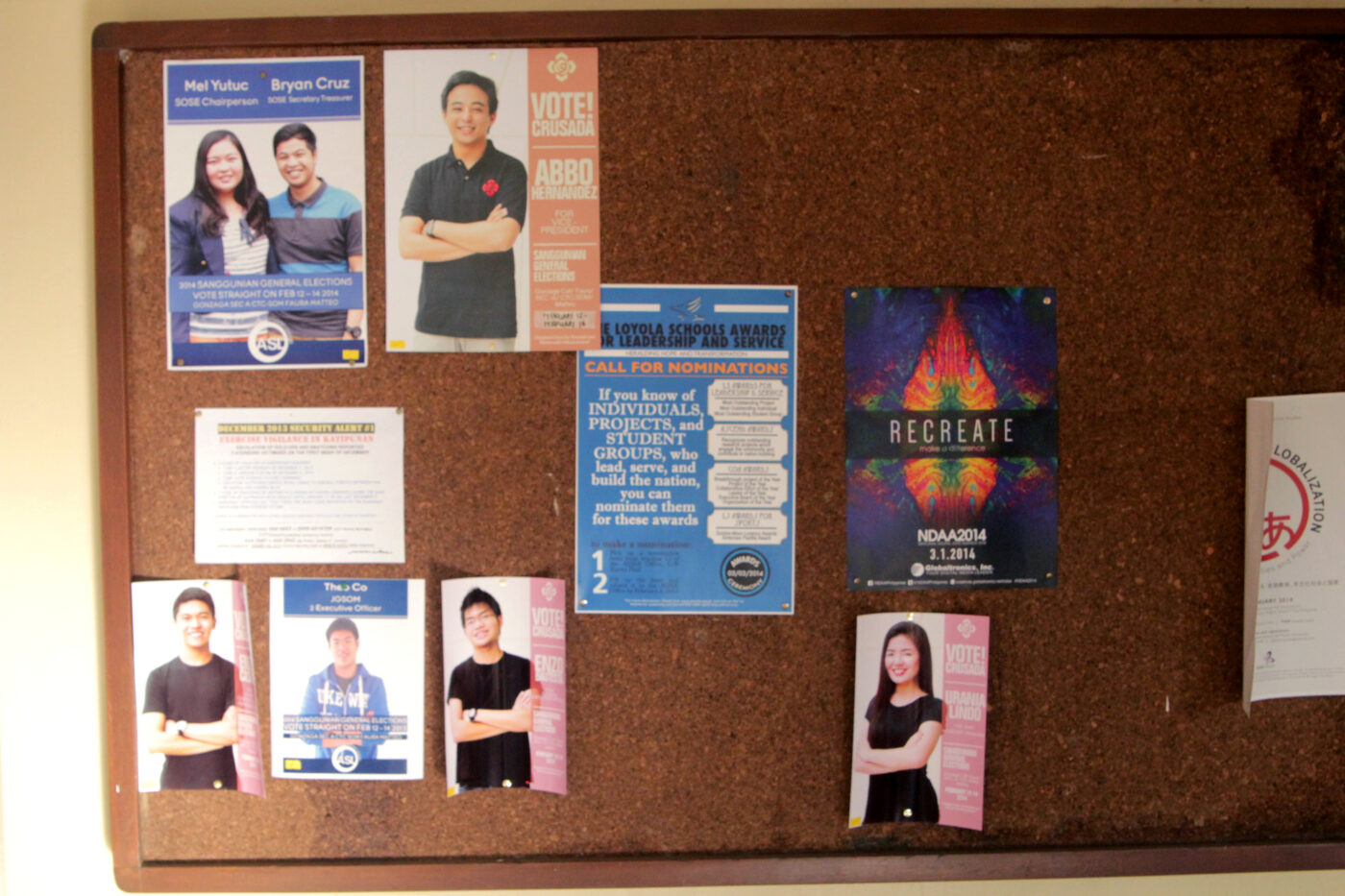THE ATENEO Commission on Elections (Comelec) and the political formations are increasing their information dissemination efforts in preparation for the 2014 Sanggunian General Elections to be held on February 12 to 14.
The move was made in the hopes of making the student body more politically aware and inclined to vote.
According to Comelec Chief Commissioner Denise Olondriz, a “step up” in their promotional efforts may prevent yet another failure of elections.
A total of 12 Sanggunian positions in the top 44 were left unoccupied after the failure of elections in the 2013 Sanggunian General Elections and the 2013 Sanggunian Freshmen and Special Elections.
Also making headway in the information dissemination campaigns are the three political formations in the university: The Alliance of Student Leaders (ASL), the Movement for Ignatian Initiative and Transformative Empowerment (Ignite) and the Christian Union for Socialist and Democratic Advancement (Crusada).
Comelec makes changes
Olondriz said that the Comelec is striving to be more visible in terms of on-campus and online promotions.
“It is important for us to be more aggressive and ‘noisier’ when it comes to getting voters, especially during the [elections] week itself,” Olondriz said.
She said that the Comelec will also continue its roving promotions from February 12 to 14 to encourage passers-by to vote.
She added that the Comelec is looking into forming partnerships with certain organizations in order to further disseminate elections-related information.
Another major change taking place this year is the reduction of election days from four to three.
Olondriz said that having four election days is expensive, mainly due to the cost of equipment rental.
She added that it seems to have no significant effect on the voter turnout. “We think that, despite the reduction of days, if students want to vote, they will.”
Planning for the general elections
The political formations are also making changes in their systems in an effort to improve their campaigns.
ASL Head Joben Odulio said that her coalition aims to widen the scope of their promotions by asking ASL candidates to conduct more room-to-room campaigning. According to her, the strategy proved to be more effective for them than online posters.
As for Ignite, Vice President for Strategy Michael Del Mundo said Ignite would be stricter in screening its potential candidates. He said this is because Ignite hopes to find people who are not only competitive during the elections but who will stay committed to their positions once elected.
Del Mundo added that Ignite will choose candidates who will be able to bring the Sanggunian closer to the student body.
Meanwhile, Crusada Party Premier Enrico La Viña said that no major changes would be made as regards his party’s campaign strategies.
He said that Crusada did not have any difficulties when it came to the campaign during the previous general elections. He added that, while they did not meet the quota of votes, there was an ample amount of people who voted for Crusada candidates.
Causes of electoral failure
Odulio, Del Mundo and La Viña also gave their thoughts on the previous electoral failures.
Del Mundo said that the low voter turnout in the previous elections might have been caused by the failure of Sanggunian officers to properly execute their proposed projects.
According to him, such behavior creates a cycle: Because the elected officers lose their constituents’ trust due to unfulfilled promises, the candidates of the next elections will fail to meet the quota of votes. This then leads to several vacancies in the Sanggunian.
Del Mundo, on the other hand, said that students’ decision to abstain from voting is not simply an act of indifference; rather, “it has become a political action to voice out their displeasure” over the performance of the Sanggunian officers.
La Viña, meanwhile, said that the students cannot be blamed if they no longer care about school politics, especially when the ruling political groups fail to make a relevant stand on national issues.
La Viña also observed that there is “too much red tape” concerning the campaigning rules of Comelec, which may have influenced the past electoral failures.
He pointed out how difficult it was for the political formations to have a creative and dynamic campaign when the content of campaign paraphernalia was strictly controlled.
Odulio shared La Viña’s sentiments, saying that the number of resources and types of campaign material permitted by the Comelec should be increased.
Odulio also disagreed with the Comelec’s decision to limit the number of banners that the candidates are permitted to put up on campus.
The 2014 Sanggunian General Elections Manual stipulates that only one banner may be used by the candidates running for the top four Sanggunian positions, namely president, vice president, secretary-general and finance officer.
Coalitions are limited to use only one banner as well, while accredited political parties may display a maximum of two banners.
Hoping for a better turnout
The Comelec and the student political formations wish to see a higher voter turnout in the upcoming general elections.
“I think it’s not instantly that we can get students to want to be involved in campus politics, but hopefully, it improves one election at a time,” Olondriz said.
Likewise, Del Mundo said, “I think a more complete Sanggunian would be in a better position to serve its constituents and prove that it still has something to offer to every Atenean.”







